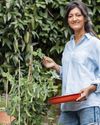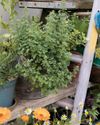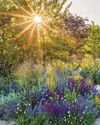
I'm a three-season gardener, which means I only garden from March to November - it's not possible for me to garden in winter as once I have a coat on I can't really use my hands. So, eking out the garden interest for as long as possible is important, particularly from late summer into autumn, making the most of the final weeks I can be outside. I sow annuals in spring to boost my floral display for as long as possible, but it's my pick of perennials that really holds the display for the final months of the gardening year.
Staking, lifting and storing plants over winter is a challenge, so to make things easier I plant mainly strong-stemmed hardy perennials to suit my abilities, as they can be maintained with just a pair of small secateurs.
Sue's pick of late-show plants
These 10 performers will all put on a late-summer display - many well into autumn. Buy them in flower now for an instant boost or plant in autumn or spring for results next summer.
1 Hydrangea macrophylla
I can safely say that with at least 25 hydrangeas in my garden these are one of my favourite late-summer plants. Tolerant of sun and shade, the flowers start to take on a subtle, softer hue as the season changes. H. macrophylla mophead varieties make striking indoor displays.
Height x Spread 1-2m x 1.5-2.5m
2 Rosa 'Mary Delaney'
I have to get close to my plants and thorny roses can hurt, so I was delighted when I discovered 'Mary Delaney', a virtually thornless rose by David Austin Roses. Pale pink and perfumed, it is a repeat-flowering climber that blooms well into autumn if regularly deadheaded.
HXS 3.75m x 1.2m
3 Hylotelephium 'Herbstfreude'
Bu hikaye BBC Gardeners World dergisinin August 2023 sayısından alınmıştır.
Start your 7-day Magzter GOLD free trial to access thousands of curated premium stories, and 9,000+ magazines and newspapers.
Already a subscriber ? Giriş Yap
Bu hikaye BBC Gardeners World dergisinin August 2023 sayısından alınmıştır.
Start your 7-day Magzter GOLD free trial to access thousands of curated premium stories, and 9,000+ magazines and newspapers.
Already a subscriber? Giriş Yap

A new plot for tasty crops
Taking on a new allotment needn't be hard work. By simply following a few easy tips you can have bumper crops in no time, just like Alessandro Vitale

We love July
July is an island floating between the joy of June and the slightly fatigued month of August. It's a grown-up month: the year has shrugged off its adolescent exuberances, the weather is (hopefully) warm enough for ice cream to be one of your five a day, the sea should be swimmable without (too much) danger of hypothermia and thoughts will be of holiday shenanigans and family barbecues. School's out this month, the next tranche of glorious summer colour is washing across our borders and it's my birthday. Lots of reasons to give three rousing cheers for July!

YOUR PRUNING MONTH
Now, at the height of summer, Frances Tophill shows how to boost your plants' health and productivity with a timely cut

Hassle-free harvests
Flowers are out in abundance this month and for Jack Wallington, many of these blooms make delicious, low-effort pickings

Bite-sized bounties
Glorious doorstep harvests can easily turn into gluts, so let Rukmini Iyer's recipes help you savour every last bit

Upcycled outdoor living
Create unique and stylish garden features for minimal cost using reclaimed materials and simple DIY skills. Helen Riches shares four step-by-step projects and more inspiring eco tips

Secrets of a COLOURFUL GARDEN
Buildings and landscapes can play a vital role in supercharging your space, as Nick Bailey demonstrates

Greening up a city balcony
Looking for sustainable, small-space gardening ideas? Take inspiration from Oliver Hymans' transformed balcony garden in north-east London - now a lush, green haven for humans and wildlife

The dry and mighty garden
As we adapt our gardens to a more volatile climate, Alan Titchmarsh reveals how to create a drought-tolerant plot and picks his top plant performers

Nature knows best
Carol Klein explains how to choose plants for specific growing conditions, based on what has naturally adapted to thrive there